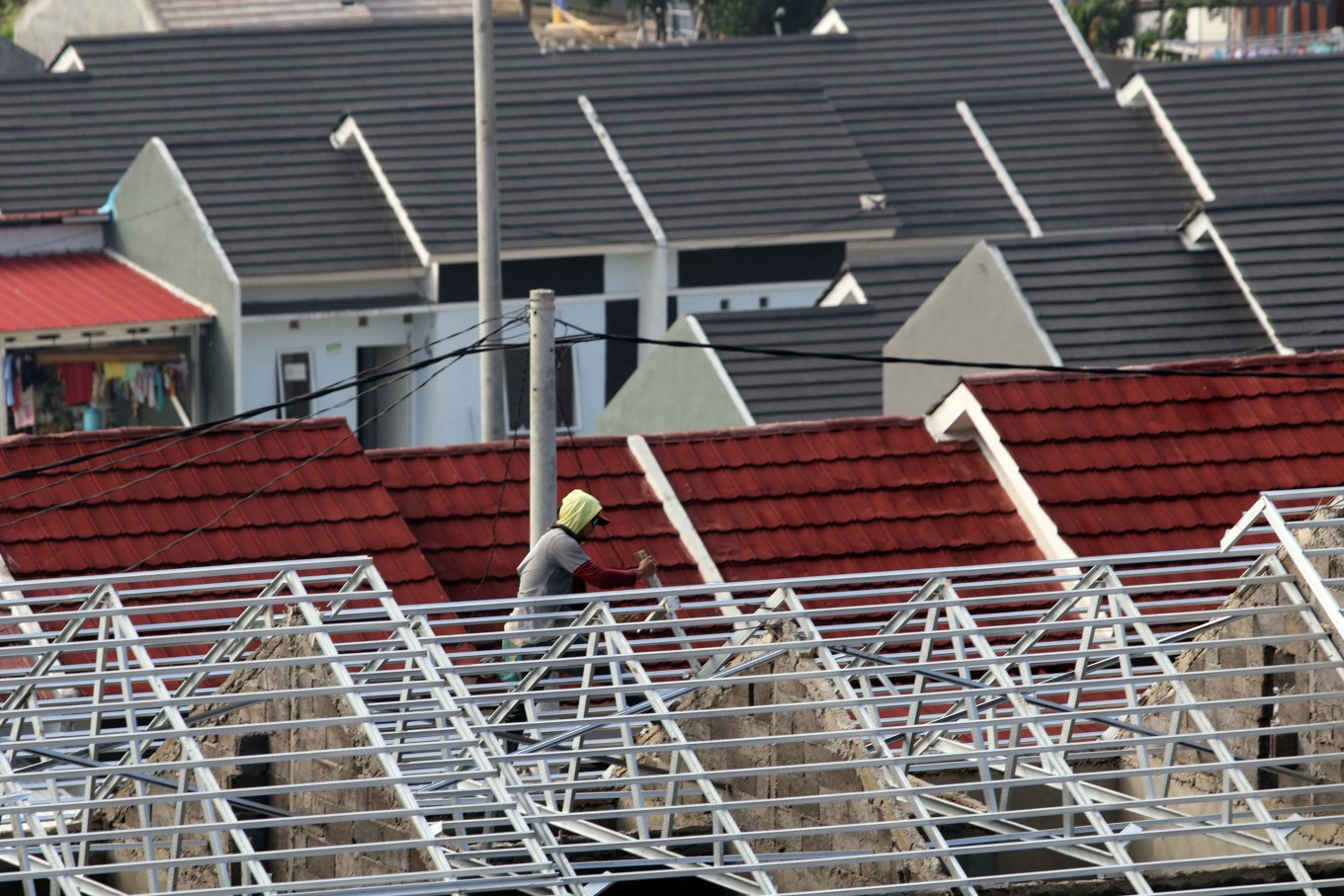News
‘3 million homes’ program in limbo after losing PSN status
Tenggara Strategics October 21, 2025 Lofty ambitions: A worker works on the roof of an under-construction house in a subsidized housing estate on Aug. 6 in Bogor, West Java. (Antara/Yulius Satria Wijaya)
Lofty ambitions: A worker works on the roof of an under-construction house in a subsidized housing estate on Aug. 6 in Bogor, West Java. (Antara/Yulius Satria Wijaya)
Faith in the implementation of President Prabowo Subianto ’s flagship “3 million homes” program has waned after it was recently excluded from the list of National Strategic Projects (PSN) as outlined in the Coordinating Economy Minister’s Regulation No. 16/2025. The setback comes following the annulment of the 2016 Public Housing Savings (Tapera) Law, which was expected to serve as a cornerstone of the government’s affordable housing drive by providing a sustainable funding source for the housing finance liquidity facility (FLPP), which provides low-interest mortgages for low-income households (MBR) under a subsidy scheme.
The Constitutional Court’s decision in early October to strike down the Tapera Law has added significant uncertainty to the government’s housing finance framework. The law had served as the legal and institutional foundation for the Tapera Management Board (BP Tapera), the public body tasked with managing both participants’ savings and government-backed housing funds.
The ruling came in response to a long-standing public backlash over Tapera’s mandatory 3 percent salary contribution, which applied to both employees and self-employed workers or business owners. Under the scheme, employees contributed 2.5 percent of their pay while employers covered the remaining 0.5 percent. Many workers viewed the scheme as adding to the already heavy burden of compulsory contributions for health insurance and social security, while businesses criticized it as an additional cost that weighed on operations.
With the law now revoked, questions have emerged over how the government will sustain existing housing finance programs. Under the current setup, the FLPP scheme is funded through a blended financing model that combines 75 percent capital from the state budget (APBN) and 25 percent from Tapera-managed funds. The court’s decision therefore disrupts not only the Tapera program’s savings mechanism but also its long-term role in cofinancing the FLPP, casting doubt on the future sustainability of affordable housing subsidies.
The FLPP’s 2025 mortgage mechanism had been poised as a breakthrough policy, offering an ultralow 1 percent down payment and a 5 percent fixed interest rate for the life of the loan. This was in stark contrast to the base interest rate (SBDK) for mortgage loans, which hovered around 9.09 percent as of February this year, with most banks setting rates between 5.54 and 12.75 percent.
In a move the government touted as proof of its continued commitment to accelerating the 3 million homes program, a mass mortgage signing ceremony dubbed “Akad Massal FLPP” was held at the end of September and attended by President Prabowo. The ceremony highlighted the cooperation between BP Tapera as fund manager and state-owned banks as implementing partners responsible for mortgage distribution. However, the symbolic event was swiftly overshadowed by news that the program had been struck from the PSN list just weeks later, a sequence of developments that sent mixed signals about the administration’s actual priorities.
Unlike social housing initiatives that prioritize affordable rentals, the 3 million homes program was unique in that it was designed to foster ownership among low- and middle-income households. The program’s success therefore hinges on access to concessional mortgage financing, a support mechanism that now stands on shaky ground.
Affordability also remains in question. In Greater Jakarta (Jakarta, Bogor, Depok, Tangerang, Bekasi), for instance, houses are priced at around Rp 185 million (US$11,200) under the scheme. This is considered affordable on paper, but often translates into just 14 square meters of building area on plots of 25-26 sq m. The compact units, first unveiled in June, sparked widespread criticism over their cramped living conditions and low real value.
Despite its removal from the PSN list, several members of the Association of State-Owned Banks (Himbara), including Bank Rakyat Indonesia (BRI) and Bank Negara Indonesia (BNI), have reaffirmed their commitment to supporting the program’s implementation, particularly on the supply side. BNI has even introduced a special housing program credit (KPP) facility that aims to extend low-cost loans to developers, contractors and real estate partners of the housing initiative.
While state-owned banks and the Public Housing and Settlements Ministry continue to voice their commitment to the 3 million homes program, skepticism remains high over whether the program will ever reach completion. So far, tangible progress has been minimal and key follow-up actions, such as the government’s pledge following the June backlash to revise the minimum building size per unit, have yet to materialize.
Instead of restoring confidence, these repeated attempts at reassurance have fueled speculation that the government is attempting to paper over a growing failure to deliver on one of its most high-profile campaign promises.
What we've heard
A Himbara bank executive revealed that the mass signing ceremony and handover of tens of thousands of FLPP houses was merely a ploy by housing minister Maruarar “Ara” Sirait to boost numbers for the widely publicized 3 million homes program.

